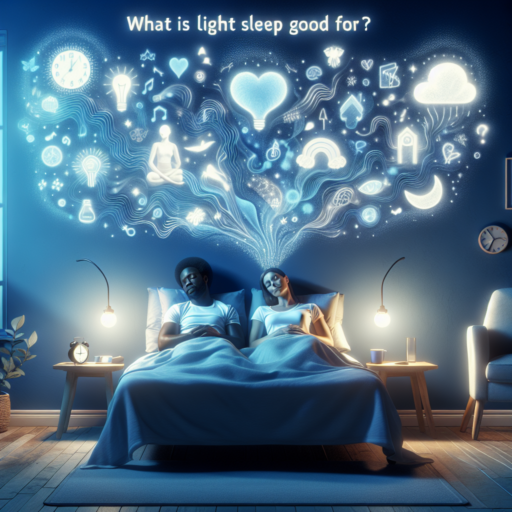No se han encontrado productos.
Is there any benefit to light sleep?
While deep sleep is often touted for its restorative benefits, light sleep also plays an essential role in our sleep cycle. Light sleep, or stage 2 of the sleep cycle, serves as a transition period between deep sleep and the more awake states. Despite its seemingly passive nature, light sleep offers several underrated benefits worth exploring. During this phase, our bodies continue to perform crucial functions that contribute to our overall well-being.
Enhanced Learning and Memory Consolidation
Light sleep contributes significantly to the process of memory consolidation, where short-term memories are transformed into long-term ones. This stage of sleep facilitates the reorganization and strengthening of neural connections, enabling better retention and recall of information. Hence, while it might seem that profound insights and learning occur during deeper sleep stages, light sleep offers its unique contributions to cognitive enhancement.
Physical Restoration and Health Benefits
Despite deep sleep’s reputation for physical restoration, light sleep also aids in various bodily functions that promote health and recovery. During light sleep, our bodies continue to repair tissues, release growth hormones, and regulate metabolism. This stage should not be underestimated for its role in maintaining physical health, as it assists in the subtle yet significant processes that keep our bodies running optimally.
How many hours of light sleep is good?
Understanding the right amount of light sleep each individual requires can be slightly intricate because sleep needs can vary significantly from one person to another. However, experts typically suggest that out of a total nightly sleep, light sleep should constitute approximately 50% to 60%. Considering an average adult might need between 7 to 9 hours of sleep per night, this translates to about 3.5 to 5.4 hours of light sleep being deemed satisfactory for most adults.
Light sleep, or stage 2 non-REM sleep, plays a critical role in cognitive function, memory consolidation, and overall health. It’s the gateway into deeper sleep stages but also serves its own essential functions. During light sleep, your body temperature drops, heart rate slows, and your brain begins to prepare for deep sleep. Therefore, striking a balance between light sleep and deeper sleep stages is vital for comprehensive restorative rest.
Identifying Adequate Light Sleep
- Adults (18-64 years): Should aim for 7-9 hours of total sleep, which means approximately 3.5-5.5 hours of light sleep.
- Older Adults (65+ years): With a total sleep need of 7-8 hours, about 3.5-4.8 hours of light sleep is suitable.
- Teenagers (14-17 years): Need more total sleep, about 8-10 hours, thus 4-6 hours of light sleep can be optimal for supporting growth and development.
While these numbers provide a guideline, it’s important to listen to your body’s signals. Factors such as stress, physical activity levels, and overall health can affect how much light sleep one might need. Tracking sleep patterns with a smartwatch or app can be a practical approach to gauge if you’re getting an optimal mix of light and deep sleep, tailored to your personal health and lifestyle needs.
Which is better, deep sleep or light sleep?
Understanding the Different Stages of Sleep
Before comparing deep and light sleep, it’s crucial to understand that both stages play unique roles in our sleep cycle. Deep sleep, also known as slow-wave sleep, is pivotal for physical recovery, memory consolidation, and ensuring a strong immune system. On the other hand, light sleep serves as a transition phase between wakefulness and deep sleep and is essential for mental recovery and memory encoding.
Benefits of Deep Sleep
Deep sleep is often championed for its restorative powers. During this stage, your body repairs tissues, builds bone and muscle, and strengthens the immune system. Moreover, deep sleep has a significant impact on your energy levels and ability to learn and remember new information. A lack of deep sleep can lead to feeling groggy and unfocused the next day.
Advantages of Light Sleep
While light sleep might seem less beneficial, it plays a critical role in mental and emotional health. It helps the brain process emotions, memories, and stress. Additionally, light sleep enhances brain plasticity, which is vital for learning new skills and adapting to new information. Maintaining a balance of light sleep stages throughout the night is crucial for waking up feeling refreshed.
What happens if you only get light sleep?
Getting primarily light sleep can significantly affect both your physical and mental health. Unlike deep sleep, which allows your body and mind to fully recover and rejuvenate, light sleep does not provide the same level of restoration. This can lead to a host of issues over time.
Firstly, without adequate deep sleep, your body struggles to repair muscles, consolidate memory, and release hormones regulating growth and appetite. This means you may experience decreased concentration and memory retention, higher stress levels, and an increase in cravings for unhealthy food. Essentially, relying solely on light sleep disrupts the body’s natural processes for maintenance and growth.
Moreover, the lack of deep sleep can weaken your immune system, making you more susceptible to illnesses. Research suggests that those who do not achieve enough restorative sleep face a higher risk of developing chronic conditions such as obesity, diabetes, and heart disease. Therefore, while you may technically be resting, only getting light sleep leaves your body underprepared to fight off infections and maintain optimal health.




